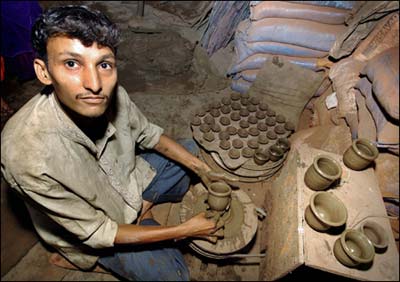 It's goodbye to plastic cups on Indian railways. Travellers now will be served water, tea and other beverages on trains and platforms in traditional earthenware mugs made by potters -- giving hope of a new lease of life for a trade under threat from the rampant use of plastic.
It's goodbye to plastic cups on Indian railways. Travellers now will be served water, tea and other beverages on trains and platforms in traditional earthenware mugs made by potters -- giving hope of a new lease of life for a trade under threat from the rampant use of plastic.
"The use of plastic cups has been totally banned," M Y Siddiqui, railway information officer, told AFP. The orders for a 'clean and green' railway came directly from the new minister in charge, Laloo Prasad Yadav.
He was elected in last month's national polls that saw the upset victory of the Left-leaning Congress alliance over the Hindu nationalists, who were criticised for ignoring the steady rise in unemployment. Yadav is aiming at helping correct this with the new scheme.
The orders by Laloo Yadav could create new jobs for millions of poor potters in India whose livelihood has been threatened by the widespread use of plastic.
The earthenware cups, called 'kulhars', are produced by small-scale regional cottage industries out of local materials, sold to small-scale tea sellers and are thrown away when the tea has been drunk.
India's train network is one of the world's largest with 63,140 kilometers (39,147 miles) of rail. Some 11,000 trains run daily, including 7,000 passenger trains carrying 13 million people.
"We estimate at least 300,000 new jobs (for potters) will be created by this scheme and 2.9 million potters' families will benefit. This will be the spin-off benefit," Siddiqui said.
"Everyday, 36,000 cups are loaded in around 27 superfast trains touching New Delhi railway station and all over India, about 10,000 cups are loaded on long distance trains that take two to three days to reach their destinations."
The official said the earthen cups will cost 10 paise, or less than one cent, a piece compared to Re 1 -- around two cents -- for the plastic ones.
He also said they could be easily disposed of and if they are thrown out of the trains, they will break into pieces and melt into the soil -- "the best way to protect the environment."
"We found out in 90 per cent of cases, users never crushed cups as required but just threw them away under their seats or on the tracks. Organised gangs of ragpickers would then pick up these cups, wash them and recycle them for use. All this will now end with the biodegradable mud cups."
Already at New Delhi railway station and elsewhere, hundreds of cups were being loaded onto trains.
In India's Parliament building, too, where the canteen is run by the railway catering department, earthen cups have surfaced with even Members of Parliament being served water and tea in them.
Environmentalists were thrilled by the move. "It will be definitely be a good decision," said Nidhi Jamwal of the Delhi- based Centre for Science and Environment.
(Picture) Dhansukh Vala, a potter in Dharavi, a Mumbai suburb, makes small clay cups, or kulhars. He is happy that the Indian Railways will be switching to using kulhars instead of plastic cups to serve water, tea and other beverages. Photo: Rob Elliott/AFP/Getty Images
-- AFP






 © 2025
© 2025